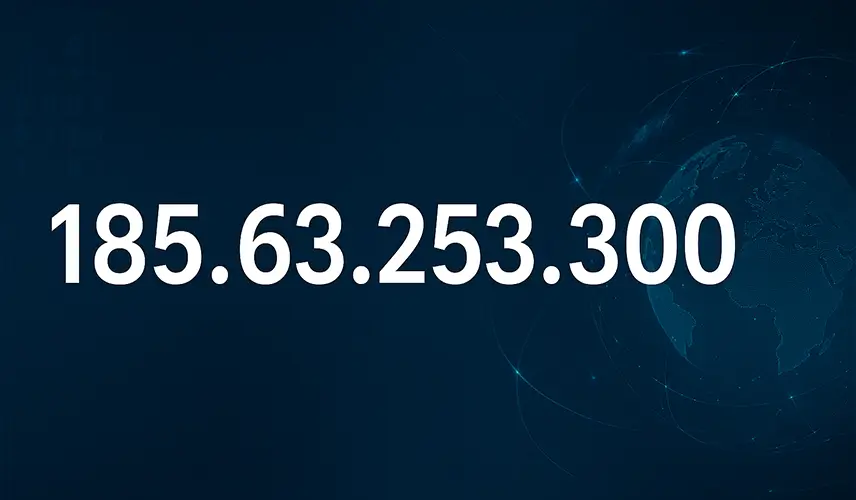Have you noticed the IP address 185.63.263.20 showing up in your server logs or firewall reports? You’re not alone. With cybersecurity concerns on the rise, it’s essential to understand what such IPs signify, how they operate, and whether or not they pose a risk. In this article, we’ll break down everything you need to know about this specific IP address, how to investigate its activity, and what steps you should take if it interacts with your system.
Understanding IP Addresses
An IP address (Internet Protocol address) is a unique numerical identifier assigned to each device connected to a computer network. It serves two main purposes:
- Identifying the host or network interface.
- Providing the location of the host in the network.
IP addresses like 185.63.263.20 are usually IPv4 addresses, which follow a dotted-decimal format. While they’re often harmless, unknown or recurring addresses can sometimes point to malicious bots, spam, or intrusion attempts.
What Is 185.63.263.20?
The IP address 185.63.263.20 is not widely associated with any known major service providers or reputable organizations. When this kind of IP repeatedly shows up in your traffic logs, it can raise some red flags, particularly in the context of:
- Unusual login attempts
- Bot traffic
- Spam comments on websites
- Brute-force attacks on WordPress or other CMS platforms
This address may be used by anonymous servers or VPNs. While this doesn’t necessarily mean it is malicious, it does warrant a closer look—especially if it appears without any legitimate user activity associated with it.
How to Investigate 185.63.263.20
If you’re trying to determine whether 185.63.263.20 is a threat or just benign network noise, follow these steps:
1. Use an IP Lookup Tool
Online tools like IPVoid, Whois Lookup, or VirusTotal can provide valuable information including:
- Hostname
- ISP (Internet Service Provider)
- Country of origin
- Reputation scores
For example, if an IP address shows up with blacklisting status, it may be known for sending spam or malware.
2. Check Server Access Logs
If you manage a website or server, look into your access logs to determine:
- The frequency of access from 185.63.263.20
- The type of pages or endpoints it’s hitting
- Whether it’s attempting to access admin pages or login portals
3. Monitor for Suspicious Behavior
Watch for signs of bot behavior such as:
- High request frequency in a short time span
- Attempted access to non-existent URLs
- Requests without user-agent strings
These signs often indicate automated tools trying to probe your website.
Steps to Take If 185.63.263.20 Appears Suspicious
If your investigation leads you to believe that 185.63.263.20 is not trustworthy, here are several actions you can take:
1. Block the IP
Use server-level firewalls like UFW, iptables, or services like Cloudflare or Sucuri to block the IP. This prevents it from accessing your system entirely.
2. Enable Security Plugins
For WordPress or other CMS-based websites, activate plugins like:
- Wordfence (WordPress)
- iThemes Security
- Fail2ban for Linux servers
These tools can automatically detect and ban IPs showing brute-force behavior.
3. Report the IP
If you believe the IP is being used for illegal or unethical purposes, you can report it to its hosting provider. Most WHOIS lookups will include an abuse contact email.
Is 185.63.263.20 a Sign of a Larger Threat?
Not necessarily. The presence of one suspicious IP doesn’t always mean your system has been compromised. However, patterns of IP behavior can reveal larger issues, such as:
- Targeted cyberattacks
- Botnet scanning operations
- Credential stuffing attempts
To stay safe, it’s essential to treat unknown IPs like 185.63.263.20 as potential risks and implement best practices for detection and prevention.
Best Practices for Managing Suspicious IP Activity
Proactive steps can make all the difference when it comes to network security. Here are a few recommendations:
- Install a Web Application Firewall (WAF): It filters and monitors incoming traffic.
- Limit login attempts: Especially important for content management systems.
- Enable 2FA (Two-Factor Authentication): Adds an extra layer of security.
- Keep systems updated: Outdated software is a common attack vector.
By maintaining a strong security posture, even persistent probing from IPs like 185.63.263.20 can be effectively neutralized.
Frequently Asked Questions (FAQ)
What country is 185.63.263.20 registered in?
Use a WHOIS lookup to determine the country of origin. These databases often reveal the ISP and location.
Is 185.63.263.20 dangerous?
It depends on context. One-time appearances might be harmless, but repeated access with suspicious behavior should be treated cautiously.
Can I trace a user from an IP like 185.63.263.20?
IP addresses can give you geographic and ISP information but generally won’t reveal personal identity due to privacy laws and the use of VPNs.
What if I see 185.63.263.20 in Google Analytics?
If this IP is generating traffic, consider filtering it out of your reports using GA’s IP exclusion features to keep data clean.
Should I permanently block unknown IPs?
It’s best to monitor behavior first. Permanent blocks are recommended only for IPs that consistently demonstrate malicious or unwanted activity.
Conclusion: Stay Informed and Protected
Seeing IPs like 185.63.263.20 in your server logs can be unsettling, but it doesn’t always mean danger. Understanding what the IP is doing and responding accordingly helps you maintain a strong cybersecurity defense. Whether you’re a web developer, network admin, or small business owner, vigilance is key.
Don’t ignore unknown traffic—investigate it. Stay informed, stay protected.

